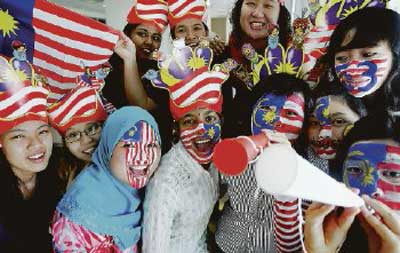Facing up to issues
Professor Tan Sri Dato' Dzulkifli Abd Razak
Learning Curve : Perspective
New Sunday Times - 02/20/2011
I WOULD like to thank Ariff Shah R. K. for his letter to the editor (New Straits Times, Feb 11) on matters of the "Paraiyars" that have been causing much anxiety recently. I appreciate his thoughts and viewpoints -- which at the end of it all -- do not differ much from what I wrote in my Feb 6 column.
Ariff seemed to concur that the Paraiyars "were indeed once landowners who lost their land, advisers to the kings, farmers, musicians, singers and members of the manual workforce" and directed the cause to the divide-and-rule policy of the British.
I believe that there are other opinions and clarifications of the subject which would further enrich the arguments. Indeed, this is what is called for, and my articles are all with this aim in mind. As we move towards the year 2020, we as Malaysians must cultivate a healthy culture of seeking to share knowledge for the sake of building a greater understanding of each other and the local society. It is not just a matter of our origins from generations ago.

If we are truly serious about advancing Malaysia to lead a
multicultural society by example, we must communicate with an
open mind
For too long, we criticise in ways that are not constructive and give myopic viewpoints. Most are highly emotional and use irrational arguments that are intended to incite rather than provide insights. This often degenerates into name-calling, labelling one another and even character assassination so as to win an argument. In the end, we gain and learn nothing new. Instead, we are more biased and prejudiced, and more resentment and tensions get bottled up.
It gets worse once an issue is politicised by those who are looking for any chance to do so at the slightest opportunity.
In the case of the so-called "pariah" issue -- now that we are informed of how it originated from the word "paraiyars" who are associated with many positive qualities -- it is sad to note that some of my colleagues had received threats for giving their honest opinions, while some declined to comment for fear of their safety. This is a dreadful state of affairs for a country that has an ambition to be a knowledge society. Couple this with the burning of books!
Ariff commented on a few "misleading" points in my column. Let me state that they were not intended to be so. My sources were secondary in nature, aimed -- as I have mentioned -- for exploratory reading. It was not meant to be exhaustive nor comprehensive. For example, on Ariff's comment that "the Brahmins are not followers of Brahma", I quote my reference source, The New Dictionary of Cultural Literacy by E. D. Hirsh Jr, et al (2002). In the chapter on World Literature, Philosophy, and Religion, under the entry "Brahmins" on page 87, it states: "Brahmins are the followers of Brahma and were originally priests."
On the point that "the Aryan Brahmins carried out conversion" and those who refused to convert were "cast out", there seems to be credible studies that imply that this activity is possible given the genetic link between the two groups. Again Ariff's explanation is much appreciated. In fact, by implying that the "conversion" did take place, it negates the issue of race, as Ariff noted, but points to it being more of non-race -- ideology, beliefs, even social status, where can one can opt to be converted.
Be that as it may, the purpose is not to assign blame or point fingers (which has been a Malaysian pastime of late) but rather to be more intellectual about it in the attempt to create in-depth understanding and trust in dealing with many difficult issues that a multicultural society like ours has to face.
Unlike some who want us to believe that offending others is a new art form (see last week's column), we must try harder by being more inclusive. Shame on those who use the 1Malaysia concept to bulldoze just about anything at the expense of others! This cannot be more obvious than during elections where demands are made to appeal to the viscera rather than minds.
All this must change if we are serious about advancing Malaysia to lead a multicultural society by example.
And there is no easy way out, more so if we cease to communicate and argue intellectually and rationally with an open mind.
* The writer is the Vice-Chancellor of Universiti Sains Malaysia. He can be contacted at vc@usm.my
